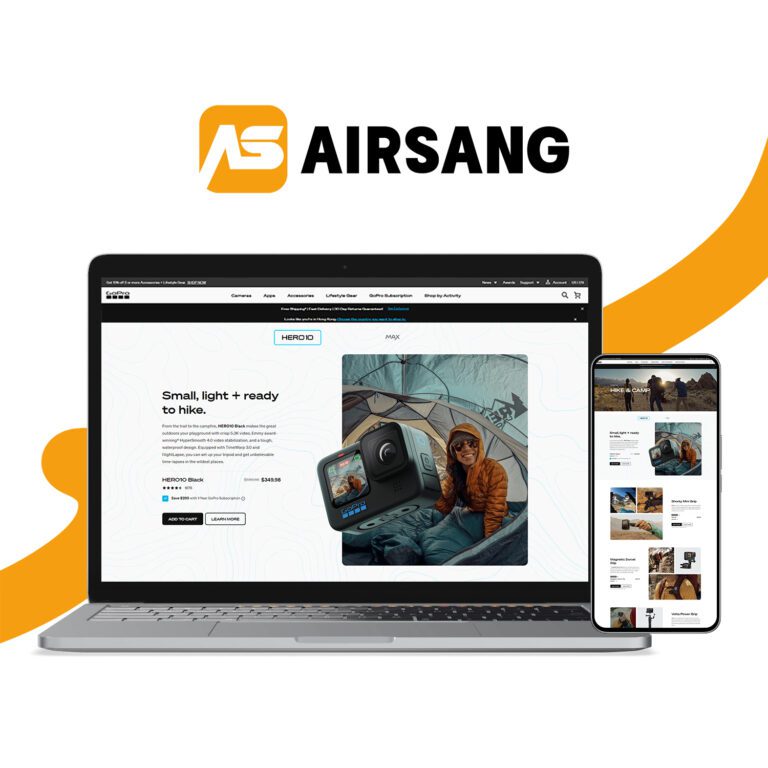Traditional vs. Independent Station Foreign Trade
The main differences between foreign trade independent stations and traditional foreign trade lie in control, branding, and customer engagement. Traditional foreign trade typically relies on third-party platforms like marketplaces, which limits control over branding and customer relationships. On the other hand, independent stations provide full control over your website design, branding, and customer interaction, enabling businesses to create a more personalized experience.
At Airsang Design, we specialize in building independent trade websites that allow businesses to take charge of their brand presence and customer experience. With our expertise, you can create a website that reflects your unique identity and drives growth.
Business model
- Foreign trade independent stations: enterprises trade directly with customers, without intermediaries, and control the entire sales process.
- Traditional foreign trade: sales through agents or distributors, with weak control.
Cost structure
- Foreign trade independent stations: initial investment is high, but long-term savings in intermediary fees increase profit margins.
- Traditional foreign trade: need to pay agent commissions, high costs, and compressed profits.
Flexibility and response speed
- Foreign trade independent stations: can quickly adjust strategies to respond to market changes.
- Traditional foreign trade: due to the participation of intermediaries, the market response is slow.
Brand building
- Foreign trade independent stations: enterprises can control brand image and enhance brand awareness.
- Traditional foreign trade: brands are promoted by intermediaries, and enterprises have weak control over brands.
Customer relationship
- Foreign trade independent station: Direct interaction with customers to enhance brand loyalty.
- Traditional foreign trade: Customer relationships are maintained by agents, and it is difficult for enterprises to closely contact end consumers.
Concept analysis
Traditional foreign trade refers to the model in which enterprises export goods through agents, wholesalers, etc., relying on intermediaries to develop markets and sell products.
Foreign trade independent station is a model in which enterprises sell products directly to overseas customers through self-built websites. Through independent domain names and e-commerce platforms, enterprises can control brand image, customer data and marketing strategies.
Respective advantages and disadvantages
- Advantages of traditional foreign trade
Agents have rich channels and market experience.
Can share part of the market promotion costs.
Disperse market risks and reduce investment risks. - Advantages of foreign trade independent station
Flexible adjustment and rapid response to market demand.
Direct sales, no intermediaries, increase profits.
Brand control, improve market awareness.
Data-driven, optimize products and strategies. - Disadvantages of traditional foreign trade
Information is limited and decisions are affected by intermediaries.
Weak brand control makes it difficult for companies to fully control.
Intermediary fees reduce profits. - Disadvantages of independent foreign trade sites
Large initial investment and high technical requirements.
Difficult market promotion and fierce competitio.

Case analysis
- Successful cases of traditional foreign trade:
A textile company entered the European and American markets through agents, steadily expanded the market, and planned to transform into an independent foreign trade site in the future. - Successful cases of independent foreign trade sites: A certain electrical appliance manufacturer successfully attracted traffic through SEO and social media marketing, improved customer satisfaction, and doubled sales. Learn more about successful cases here.
Operational procedures of traditional foreign trade
- Market research
Understand the target market demand and competition, and choose the right agent. - Logistics management
Choose a suitable logistics company to ensure that the goods arrive safely and on time, and complete customs clearance procedures smoothly. - Contract signing
Ensure that the contract complies with laws and regulations and choose a safe payment method.

Construction and operation of independent foreign trade sites
- Website construction
Choose a suitable platform such as Shopify or WooCommerce to ensure that the website design is in line with the user experience, the page loads quickly, and supports mobile terminals. Update product information regularly to improve SEO ranking. - Marketing promotion
Optimize SEO, use social media such as Facebook and Instagram for promotion, and build an email marketing database. - Customer service
Establish a multi-channel customer service system, provide timely after-sales service, and increase customer loyalty.
Choose a suitable foreign trade model
- Market target
Choose a suitable foreign trade model according to the characteristics of the target market. - Enterprise scale and resources
Small enterprises can choose traditional foreign trade, and large enterprises can establish independent stations. - Risk tolerance
Assess your own risk tolerance and financial status.
Conclusion:
Foreign trade independent stations and traditional foreign trade have their own advantages and disadvantages. Enterprises should choose the appropriate model according to actual conditions. As the market changes, foreign trade independent stations are increasingly favored due to their flexibility and control, but traditional foreign trade still has advantages in some markets.
If you are interested in these contents or want to know how to optimize your independent website, please feel free to contact airsang design!
















